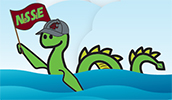By Beverly Makhani, Office of Undergraduate Education
 PULLMAN, Wash. – Washington State University is hopeful that freshmen and seniors can use their smartphones this spring to tell the institution how it is doing.
PULLMAN, Wash. – Washington State University is hopeful that freshmen and seniors can use their smartphones this spring to tell the institution how it is doing.
Starting Tuesday, March 24, questions will be sent to about 11,000 students’ email accounts, asking about the quality of their educational and campus experience and environments and what could be improved.
While this will be the ninth time in 16 years that WSU students have taken the National Survey of Student Engagement (NSSE), the 2015 study is the first that can be responded to using mobile media.
Mobile devices add ease
“We are pleased that WSU is one of a select set of universities chosen to test drive NSSE’s new mobile device compatibility,” said Mary F. Wack, vice provost for undergraduate education. “We expect that student participation will go up as a result.”
Stephanie L. Kane, interim assistant director of the WSU Office of Institutional Research, coordinates the NSSE effort for all campuses.
Faculty asked to publicize survey
 On Tuesday, NSSE will send to the emails of WSU freshmen and seniors a link to the survey, with a cover letter from Provost and Executive Vice President Daniel Bernardo. Faculty are asked to announce in their classes that freshmen and senior students should check their email accounts and follow the link to the NSSE survey.
On Tuesday, NSSE will send to the emails of WSU freshmen and seniors a link to the survey, with a cover letter from Provost and Executive Vice President Daniel Bernardo. Faculty are asked to announce in their classes that freshmen and senior students should check their email accounts and follow the link to the NSSE survey.
Reminder emails from Wack and NSSE will go to nonrespondents on April 1, 7, 13 and 21. Kane noted that “student responses may be submitted through May, but we see that most students respond on and around the dates they receive the emails.”
More responses needed for change
“Our goal is to get input from all freshmen and seniors,” said Kane. “Last year, only about one-fourth of a similar pool responded to the 2014 NSSE. WSU Spokane had the highest response rate with 28.5 percent and Pullman had the lowest with 16.9 percent.
“WSU Vancouver had 26.6 percent, WSU Tri-Cities 25.3 and the Global Campus 22.4,” she said. “We would like to see all of those go up quite a bit. When more students respond, the overall results are more valid and we get a clearer picture of student engagement.”
Strong on senior projects, service learning
Responses to previous NSSE surveys have led to changes in policies, curriculum and resources that benefit students. The data is still under review, but one key finding from the 2014 survey indicates that WSU seniors are more likely than students at peer institutions to complete a senior project, capstone course or other culminating experience.
In addition, WSU courses are more likely to incorporate a service learning component than courses at peer institutions. Service learning and culminating senior experiences are both considered “high impact practices” that can have long-term benefits for the students.
AAU, Carnegie comparisons
NSSE data also provides insights into how WSU stacks up compared to other polled universities. WSU’s comparison groups include members of the American Association of Universities (AAU) and other high-research universities as classified by the Carnegie Foundation.
NSSE results back to 2008 can be found on the Institutional Research website at http://ir.wsu.edu/Student%20Surveys#NSSE.
Gift cards provide incentive
“As an added incentive to students in Pullman, we will draw 10 names from the pool of freshmen and seniors who complete the survey and award $100 Visa gift cards to each of them,” said Kane. Other campuses are also offering gift card drawings to their respondents.
Several programs and student groups are helping to raise awareness of the NSSE and its importance to the university. Promotions will abound that feature the green NeSSiE creature wearing a WSU hat. The character was created in 2014 by alumnus Sean Robertson to connect the name of the survey to Scotland’s Loch Ness creature.
For more information, visit http://NSSE.wsu.edu.